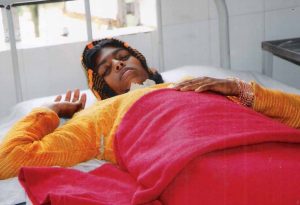NEW DELHI (Morning Star News) – When Laxmi Sovi, a Christian widow in India’s Chhattisgarh state, heard her door opening one morning last month, she could not have guessed that by the next day she would be hospitalized and her home demolished.
Three Hindu extremists identified only as Veeru, Chaytu and Mangru barged into Sovi’s house in Kakadi Beda village, Kondagoan, at 9:30 a.m. on Aug. 24 and demanded that she and her children convert back to Hinduism, she told Morning Star News. In spite of threats, she declined.
The three men left.
That night at about 11 p.m., the same Hindu nationalists forced their way into her house.
“They asked me why I converted to Christianity and left all the Hindu idols, and they also told me that I should reconvert to Hinduism or else be killed,” Sovi said.
Doddamma’s daughter Laxmi was found semi-conscious after the beating. (Morning Star News)
Sovi, who became a Christian four years ago, refused to renounce Christ. The Hindu extremists began beating her and her two children, threatening to rape her teenage daughter. The children managed to escape and hid in the surrounding jungle, but the men continued to slap, kick and punch Sovi as they insisted she leave Christ.
One of the men struck her on the neck with a club, and she collapsed in pain. Later she also took refuge in the jungle, where she hid for the rest of the night – with a fractured left hand, swelling on her neck and multiple contusions.
The next morning, Sovi returned home with area Christian leaders to find her house demolished. She received treatment at Rabindranath Tagore Hospital in Kondagoan.
“As her house was completely demolished, she is taking shelter at the house of another Christian in the area,” the Rev. A.K. Netam, an area pastor, told Morning Star News.
Mother, Daughter Dragged to Temple
A week before, in the southern state of Karnataka, Hindu extremists dragged another widow, along with her daughter, to a Hindu temple and beat her unconscious when she refused to convert back to Hinduism.
Led by Hindu extremist Chinna Bhovi, the assailants forced their way into the home of a widow who goes by the single name of Doddamma at 6:30 p.m. on Aug. 18 in the Government Ashraya housing area of Chickmagalur, pastor T.S. Surendara of the Rehebothe Prarthana Mandir Church told Morning Star News.
The Hindu nationalists asked them who gave them permission to convert to Christianity and talk about Christianity with their neighbors, Surendara said. They dragged Doddamma and her daughter, Laxmi, to a Hindu temple and tried to force them to convert back into Hinduism, but they refused to renounce Christ.
“The extremists beat, kicked and punched them with their hands for almost an hour and uttered foul abuse at them,” Surendara, their pastor, said.
Doddamma lost consciousness, and her daughter was semi-conscious when neighbors found them lying on a road, reported attorney Moses Muragavel of the Karnataka Legal Aid Cell.
Doddamma and Laxmi suffered multiple bruises and swelling; they were hospitalized for three days.
“The extremists also looted Doddamma’s house, stole their safe cupboard, clothes, ration card and all important documents, and further vandalized her house,” Surendara said.
Police have registered a First Information Report against seven suspects under various sections of the Indian Penal Code, but no arrests had been made at press time.
In another incident in Karnataka, Hindu extremists attacked house church pastor Parama Jyothi in Mobanahalli village, in Chitradurga District, on Aug. 11.
“At about 10 a.m., the extremists barged in while we were praying and started to beat me up,” Pastor Jyothi told Morning Star News.
The Hindu extremists dragged him along a road, tearing his clothes until he was half-naked. Pastor Jyothi’s body was covered in bruises, and three front teeth were broken, reported Muragavel of the Karnataka Legal Aid Cell.
Church members took their pastor to a hospital, where he was treated for about a week.
Pastor Jyothi submitted a letter to the Bejikere Police Station requesting protection, as the Hindu extemists had sternly warned him that he should vacate the house and leave the village within a week if he continued to follow Christ.
Credit: Morning Star News
Click Here for source


